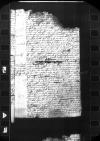 AAWO, AB, D. 7, f. 10r
AAWO, AB, D. 7, f. 10r
Nuntio meo on the margin⌈⌊Nuntio meo⌋Nuntio meo on the margin⌉[1] XIII-a huius [...] paper damaged⌈[...][...] paper damaged⌉ ⌊dominorum consiliariorum paper damaged⌈[um]um paper damaged⌉⌋ respondent in a [...] paper damaged⌈[...][...] paper damaged⌉.
Inte paper damaged⌈[Inte]Inte paper damaged⌉rim vero misit ad me ⌊reverendissimus dominus⌋[2] [...] paper damaged⌈[...][...] paper damaged⌉ in in quibusdam nostris negotiis [...] paper damaged⌈[...][...] paper damaged⌉ ⌊serenissimae paper damaged⌈[serenissimae]serenissimae paper damaged⌉ maiestatis regiae⌋ ad me pervenisse [...] paper damaged⌈[...][...] paper damaged⌉ ⌊dominis paper damaged⌈[dominis]dominis paper damaged⌉ consiliariis⌋ ante nostra ⌊comitia⌋ impr[...] paper damaged⌈[...][...] paper damaged⌉ licuit, cum igitur eas litteras regias [...] paper damaged⌈[...][...] paper damaged⌉perissem ⌊magistratui Gdanensi⌋ ratione contributionis [...] paper damaged⌈[...][...] paper damaged⌉ scriptum esse, misi easdem litteras, [...]s, quas nuper [...] meus appet[e]rat on the margin⌈[...] hidden by binding⌈[...][...] hidden by binding⌉s, quas nuper [...] hidden by binding⌈[...][...] hidden by binding⌉ meus appete paper damaged⌈[e]e paper damaged⌉rat[...]s, quas nuper [...] meus appet[e]rat on the margin⌉ cum resignation paper damaged⌈[ation]ation paper damaged⌉e ⌊reverendissimo domino paper damaged⌈[everendissimo domino]everendissimo domino paper damaged⌉ Cu paper damaged⌈[Cu]Cu paper damaged⌉lmen(si)⌋, ut ⌊Gdanum⌋ perferri written over e⌈eii written over e⌉ curaret. Opus itaque no[n] superinscribed⌈non paper damaged⌈[n]n paper damaged⌉no[n] superinscribed⌉ erit non aliis litteris, quarum misi exemplum, nisi et de prioribus in illis fieret mentio, quo sic tanto vehementius contributio on the margin⌈contributiocontributio on the margin⌉ urgeantur adscribed⌈urur adscribed⌉. Ad quam si iterum ipsi ⌊mei gentiles⌋ non accesserint, et, quemadmodum iam non semel reluctati fuerint, nihil cum aliis statibus et ordinibus hic efficiemus, quae ab illis dependent, neque ea in re facturi sine or sive or sint⌈sinesine or sive or sint⌉ non aliud on the margin⌈non aliudnon aliud on the margin⌉, quam / quod non(?) viderint illos facientes. Inconsentaneum ob id non esset, ut denuo admonerentur, etiamsi litterae regiae serius vel in ipso ⌊nostro conventu⌋ nuntiis eorum redderentur.
Pudet me, Reverendissime mi Domine, quod quidem et Dominationi Vestrae Reverendissimae usu venire existimo, quo or que⌈quoquo or que⌉
me toties adeo demisse superinscribed in place of crossed-out submisse⌈submisse demisse demisse superinscribed in place of crossed-out submisse⌉, nedum diligenter, ⌊magistratum Gdanensem⌋ pro ⌊Ioanne Holsten⌋ nequicquam on the margin⌈nequicquamnequicquam on the margin⌉ ⌊⌋, eo illum quidam longe gravius quam prius implacabili odio persequuntur afflictum superinscribed in place of crossed-out miserum⌈miserum afflictum afflictum superinscribed in place of crossed-out miserum⌉que adigere volunt, ut honoris et existimationis quae superinscribed in place of crossed-out publicitus and then crossed-out⌈publicitus ... illegible⌈...... illegible⌉ superinscribed in place of crossed-out publicitus and then crossed-out⌉ coram omni populo apertis in sessionibus paper damaged⌈[nibus]nibus paper damaged⌉ [...] paper damaged⌈[...][...] paper damaged⌉ s paper damaged⌈[s]s paper damaged⌉alutem iacturam [...] hidden by binding⌈[...][...] hidden by binding⌉tio, per quam pub[lica]m revocationem on the margin⌈tio, per quam publica hidden by binding⌈[lica]lica hidden by binding⌉m revocationemtio, per quam pub[lica]m revocationem on the margin⌉ faciat, tantum abest qui mallet quam citius et bonis, et vita cedere, antequam in perpetuam illiusmodi ingnominiam incidat, [qua](m) boni viri in ma[gist]ratu, quibus rigor [vald]e displicet, et
[in] scripto dec mihi [de]clararunt on the margin⌈ qua hidden by binding⌈[qua]qua hidden by binding⌉(m) boni viri in magist hidden by binding⌈[gist]gist hidden by binding⌉ratu, quibus rigor vald hidden by binding⌈[vald]vald hidden by binding⌉e displicet, et
in hidden by binding⌈[in]in hidden by binding⌉ scripto dec mihi de hidden by binding⌈[de]de hidden by binding⌉clararunt [qua](m) boni viri in ma[gist]ratu, quibus rigor [vald]e displicet, et
[in] scripto dec mihi [de]clararunt on the margin⌉. Quam auctoritatem et pondus Dominationis Vestrae Reverendissimae perinde atque meae pro ⌊illo⌋ commendationes habuerint, satis est luculentum.
Isti, qui hoc negotium adeo exasperarunt (suntque de nostris, qui magis plurimum nobis intimi videri volunt), nullius nostrum superinscribed⌈nostrumnostrum superinscribed⌉ se opera aliquando indigere superinscribed in place of crossed-out indignaturos(?)⌈indignaturos(?) indigere indigere superinscribed in place of crossed-out indignaturos(?)⌉ putant. Indigni vicissim, quibus a on the margin⌈aa on the margin⌉ Dominatione Vestra Reverendissima quacumque etiam in re in posterum on the margin⌈in posterumin posterum on the margin⌉ gratificetur, me certe multum a se abalienarunt, cum in hac causa, tum quia toti madent Luteranismo, totam enim Quadragesimam
... illegible⌈...... illegible⌉sime or sive⌈simesime or sive⌉
enim transactam usu carnium cum multorum offendiculo publice sunt abusi. Praeterea, cum nuper superinscribed⌈nupernuper superinscribed⌉ electio ⌊magistratus⌋ fieri deberet et ob id ad ecclesiam ex more convenissent sacerdosque superinscribed⌈queque superinscribed⌉ se ad solitam superinscribed⌈solitamsolitam superinscribed⌉
canendam missam de Spiritu Sancto altari se superinscribed⌈sese superinscribed⌉ applicasset, iussus fuit re divina infecta sacrum relinquere. Nihilo secius omnia apud illos aguntur, quam apud ⌊vicinum⌋ meum, ad cuius exemplum pro consuetudine, quae illis cum cum eo est coniunctissima, se totos componunt. Si ⌊serenissima maiestas regia⌋ sua auctoritate diutius connivebit, ne quid gravius, immo periculosius quam written over vel⌈vel quam quam written over vel⌉ prius umquam consequatur, maxime est superinscribed⌈estest superinscribed⌉ verendum. Non abs re foret, si serio in eo iis superinscribed in place of crossed-out ea in re and then crossed-out⌈ea in re in iis adscribed in place of crossed-out eo⌈eo iis iis adscribed in place of crossed-out eo⌉ in eo iis superinscribed in place of crossed-out ea in re and then crossed-out⌉,
tu(m) or t(ame)n⌈tu(m)tu(m) or t(ame)n⌉
ob processionem Corporis Christi Sanctissimi intermissam[3] ad ⌊conventum⌋ futurum a serenissima ⌊maiestate regia⌋ scriberetur.
Haec, quemadmodum alia omnia, in aurem scripseram manu mea, sed vix ipse hoc caliginoso tempore meas notas agnovi. ⌊Vulcano⌋ dentur, oro.
Meque Dominationi Vestrae Reverendissimae intime et studiosissime commendo.

 AAWO, AB, D. 7, f. 10r
AAWO, AB, D. 7, f. 10r